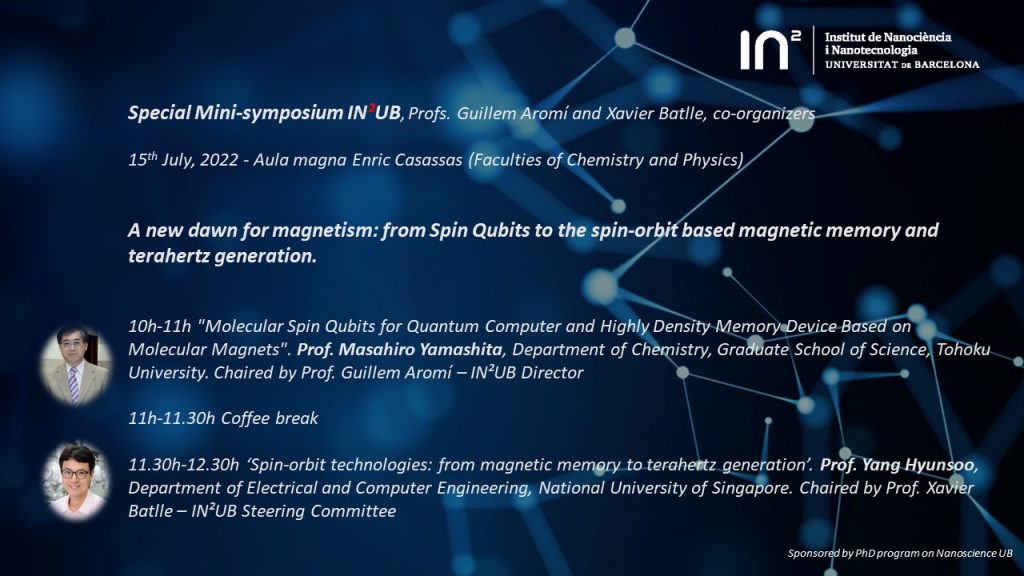In frame of the International Research Seminars, the IN²UB organizes the specific:
Special Mini-symposium IN²UB, Profs. Guillem Aromí and Xavier Batlle, co-organizers
A new dawn for magnetism: from Spin Qubits to the spin-orbit based magnetic memory and terahertz generation.
15th July, 2022 – Aula magna Enric Casassas (Faculties of Chemistry and Physics)
[Registration required to know the capacity. Until July 7th]PROGRAM
10h-11h “Molecular Spin Qubits for Quantum Computer and Highly Density Memory Device Based on Molecular Magnets”. Prof. Masahiro Yamashita, Department of Chemistry, Graduate School of Science, Tohoku University. Chaired by Prof. Guillem Aromí – IN²UB Director.
As for molecular spin qubits, I will focus on the following three engineering methods: (1) crystal engineering method such as MOF spin qubits, (2) g-tensor engineering method, and (3) orbital engineering method”. As for highly density memory devices, I will focus on single-molecule memory device of TbPc2 SMM by using STM and STS. Then, I will focus on the negative magnetoresistance in SMMs encapsulated into SWCNT and metallic conducting SMMs by the interaction between conducting electron and localized SMMs.
11h-11.30h Coffee break
11.30-12.30h ‘Spin-orbit technologies: from magnetic memory to terahertz generation’. Prof. Hyunsoo Yang , Department of Electrical and Computer Engineering, National University of Singapore. Chaired by Prof. Xavier Batlle – IN²UB Steering Committee
Over the last decade, spintronic research has focused largely on techniques based on spin-orbit coupling, such as spin-orbit torques (SOTs), to alter the magnetic state. I will discuss the latest trends in SOT research, such as the exploration of novel material systems like topological materials and 2D materials to improve the SOT efficiency. Moving forward, I will introduce the process of terahertz generation in magnetic heterostructures, where the spin-orbit coupling phenomenon plays a dominant role. I will discuss the details of how this terahertz emission process can be extended to novel material systems such as ferrimagnets, topological materials, and 2D materials. The final section will focus on how the terahertz generation process can be used to measure the interrelation between terahertz generation and the SOTs, which are linked by the underlying spin-orbit coupling.
SPEAKERS
Professor Masahiro Yamashita is one of the world leading figures in the scientific research areas of molecular magnetism, quantum computing and spintronics. He received his PhD in Coordination Chemistry from Kyushu University in 1982. From 1983 to 1987, he worked as an Assistant Professor at Kyushu University. From 1987 to 1998, he worked as an Associate Professor at Nagoya University. From 1999 to 2004, he worked as a full Professor at Tokyo Metropolitan University. From 2004, he is a full Professor at Tohoku University. He has published more than 500 papers and has received numerous awards including Fellow of Royal Society of Chemistry (FRSC), Award of Japan Society of Coordination Chemistry and The Chemical Society of Japan Award. He has organized a large number of international conferences on coordination chemistry (ICCC) or magnetism (ICMM, ACMM, etc.)
Hyunsoo Yang obtained the bachelor’s degree from Seoul National University and the PhD degree from Stanford University. He worked at C&S Technology, Seoul; LG Electronics, San Jose, CA; and Intelligent Fiber Optic Systems, Sunnyvale, CA, USA. From 2004 to 2007, he was at the IBM-Stanford Spintronic Science and Applications Center, IBM Almaden Research Center. He is currently a GlobalFoundries Chaired Professor in the Department of Electrical and Computer Engineering, National University of Singapore, working on various magnetic materials and devices for spintronics applications. He has authored 220 journal articles, given 130 invited presentations, and holds 15 patents. Prof. Yang was a recipient of the Outstanding Dissertation Award for 2006 from the American Physical Society (GMAG) and IEEE Distinguished Lecturer of Magnetic Society for 2019.
Sponsored by PhD program on Nanoscience UB
Right of information in relation to the data processing: Assistants’ Right Information

